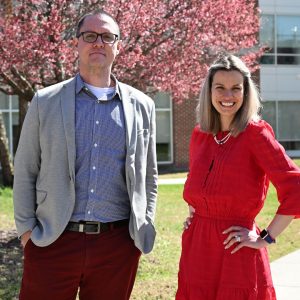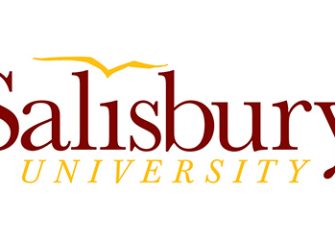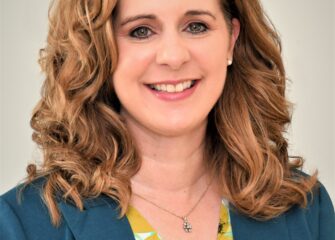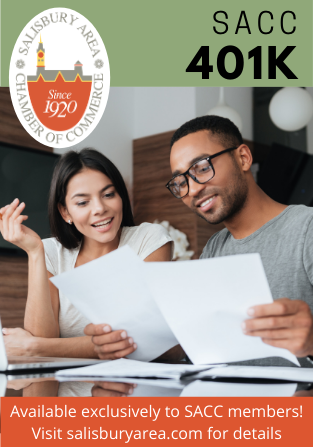
Salisbury, MD – Vampires and generational war stories aren’t topics explored on every college campus.
At Salisbury University, however, Drs. Viktoria Basham and Ryan Habermeyer are working to make sure these subjects receive their due in the annals of academia. Next year, both will spend several months in Europe teaching and furthering their research in these areas as 2024-25 U.S. Fulbright Scholars.
“We take great pride in the selection of Drs. Basham and Habermeyer to represent Salisbury University through the prestigious Fulbright program,” said SU President Carolyn Ringer Lepre. “This opportunity not only allows our faculty to extend their scholarly pursuits globally, but also enriches the educational journey of our students. Through their international experiences, our faculty bring back invaluable insights that invigorate our classrooms, broadening the horizons of our students and preparing them to thrive in an interconnected world.”
Sponsored by the U.S. Department of State’s Bureau of Educational and Cultural Affairs, the Fulbright is America’s flagship international exchange program.
Through the initiative, Basham, a lecturer in SU’s Glenda Chatham and Robert G. Clarke Honors College and assistant director of the University’s Nationally Competitive Fellowships Office, will spend the spring 2025 semester and part of the summer conducting research and teaching in Sofia, Bulgaria. During roughly the same time, Habermeyer, associate professor of English in SU’s Charles R. and Martha N. Fulton School of Liberal Arts, will serve as a visiting scholar at the University of Gdańsk, Poland.
Both became interested in the Fulbright Scholar program while assisting those applying for the Fulbright Student program through the National Competitive Fellowships Office and were inspired by previous SU Fulbright Scholars. They hope their experience completing their own successful applications will allow them to share an even more in-depth view of the process for future student applicants, furthering SU’s reputation as a top producer of Fulbright Students and Scholars in the U.S.
Dr. Viktoria Basham
For many Americans, the idea of vampires begins and ends with variations on Bram Stoker’s Dracula. However, that character represents a largely Western European view of the restless revenant, according to Basham, whose scholarship focuses on folklore and, specifically, the field of vampire studies.
“Eastern Europe is the birthplace of the modern Western European view of the vampire,” she said. “However, the Eastern European vampire is not a polished, charming count who returns from the grave to drink human blood. The Slavic grandparent of Dracula is a disheveled, bloody, bloated body of a peasant that returns to inflict harm on the living, which may or may not involve drinking their blood.”
During her Fulbright appointment, Basham plans to research the regional differences in Bulgarian vampire folklore and the beliefs that led to varied interpretations of the revenant. She hopes to produce a bilingual digital map highlighting these differences, with studies continuing following her return to SU — perhaps even involving honors students.
“I’m super excited because this really touches on both of my passions: teaching and research,” she said.
While in her native Bulgaria, she also will teach the course “The Global Vampire,” examining the mythology of vampires and vampire-like creatures around the world, at the University of Library Studies and Information Technologies in Sofia. The class will touch on the impact of those fictional beings on fields including literature, film, art, health, biology, psychology and economics. She envisions field trips to areas of Bulgaria where vampire lore is strongest, including museums and even burial sites of purported vampires.
“Younger people [in Bulgaria] are losing touch with their own traditions and culture,” said Basham. “When you say ‘vampires,’ people my age and younger in Bulgaria are thinking ‘Dracula.’ They have this Western idea in mind, but no one really knows or remembers that our land is really one of the birthplaces of the Western idea of the vampire, which used to be very different before it mutated into what it is now.
“This project will help preserve this valuable aspect of Bulgarian cultural heritage while making it more accessible to people in the digital age, thus positioning it in global context.”
Dr. Ryan Habermeyer
Habermeyer never knew his great-grandfather. However, thanks to an oral history recorded by his father and grandfather, he does know about his great-grandfather’s exploits as a U.S. soldier in Europe during World War I.
Or maybe that should be “alleged” exploits. As war stories are wont to do, Habermeyer believes his great-grandfather’s may have become a little exaggerated through time, memory and the generational telephone game.
And he’s perfectly fine with that. Though predominately a fiction writer, Habermeyer is also a literary scholar who studies post-truth, an interdisciplinary academic field examining the philosophical questions surrounding the contested concept of truth. Or, as he puts it, studying the “blurred lines between facts and fictions.”
Habermeyer’s creative research project during his Fulbright aims to explore what happens when society follows the old adage, “When the legend becomes fact, print the legend.” Relying on extensive research travels, he will author a semi-biographical novel, what he calls a “true but also fictionalized account” of his great-grandfather’s wartime experiences.
“It’s a surreal book full of impossible scenarios,” he said. “It’s meant to get you questioning what is true and what is false.”
To get a feel for what the elder Habermeyer may have experienced on the European battlefields more than a century ago, the SU faculty member plans to visit parts of Poland where the war took place and research as much of the conflict as possible through primary sources.
Never mind that his great-grandfather never set foot in that country.
“My great-grandfather didn’t fight in Poland,” he said. “He fought on the Western Front. But because I’m a fiction writer, we have the luxury of making stuff up from time to time.”
Habermeyer was inspired to apply for the Fulbright in Poland through connections made at a conference there in 2022. His fellowship also includes the opportunity to teach a course examining the intersection of post-truth and folklore, in particular the influence literature and film have on shaping public understanding of “fake news.”
“The book project and the teaching project sort of melded together,” he said, noting that there also would be a third, supplemental element.
“One of the cool things about my great-grandfather is, he came back [from Europe] with a lot of artifacts from his time there, little mementos and souvenirs,” he said. “I thought it would be interesting to curate a little mini-museum that ties together Polish history with his.”
In keeping with the theme, some of the artifacts on display would be actual relics from the war, sourced from Polish antique and pawn shops. Others would be fabricated by Polish artists. Only Habermeyer would know what’s real vs. what’s “real,” further straddling the line between fact and fiction.
Looking Ahead
Both Basham and Habermeyer hope their Fulbright experiences will help advance SU’s study abroad programs, expanding opportunities for partnerships in their host countries. (Habermeyer, in particular, has participated in the University’s “SU in Scotland” global campus program, teaching a course on myth, legend and folklore, with plans to join the “SU in Spain” program this summer.)
They also believe their research in folklore and tall tales will translate to a better experience for SU students. Currently, Basham teaches the honors course Campus Legends and Mysteries, through which students research SU history, legends and superstitions to serve as the basis for a campus tour that leans toward the strange and supernatural. Habermeyer teaches an honors course on fairy tales, which provides students with the unique opportunity to gain a deeper and more sophisticated understanding of popular fairy tales and to write their own adaptions.
Finally, they both hope their success with the Fulbright program will encourage others — both students and faculty — to use the SU resources such as the Nationally Competitive Fellowships Office to pursue similar opportunities.
“I know it can be frightening submitting an application and potentially getting a rejection, but it’s one of the best things you can do for yourself,” said Basham. “It can give you a really great opportunity to do some things you’ve always wanted to do.”
Learn more about SU and opportunities to Make Tomorrow Yours at www.salisbury.edu.




